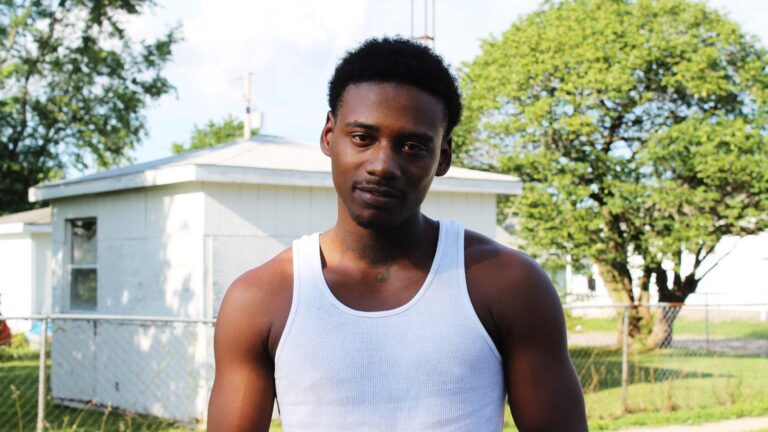CHAMPAIGN – Ri’Chard Frazier took his role as a big brother seriously from a young age.
By middle school, being the “tough” one started to get him in trouble. He bounced between public and alternative schools.
The first time he felt cared for was at FirstFollowers, a nonprofit Champaign recently entrusted with half a million dollars to prevent gun violence in the city.
“Marlon actually cares about you. The school doesn’t even care. Marlon is actually trying to put you in position [to succeed],” Ri’Chard says.
Marlon Mitchell founded FirstFollowers as a re-entry program, because of his own experience struggling to find a job and housing after being incarcerated. His “Go Make A Difference” (GoMAD) program helps with the job side of the equation through construction training and education.
When Ri’Chard was 17-years-old, he became the youngest participant in GoMAD, even though he had never been incarcerated. He spent about one year with the program working, finishing his GED and earning licenses for skills like using a forklift.
Then in 2020, the COVID-19 pandemic hit Champaign. FirstFollowers paused the program.
Ri’Chard says he suddenly had too much free time.
“Having a lot of free time in Champaign is not even good. Especially with the crowd I was [with] in high school. I wasn’t in a good crowd in high school,” Ri’Chard says.
In late 2021, he was arrested for possessing a gun without a firearm identification card. He says he was in the wrong place at the wrong time.
“I don’t even do anything violent. I just kept a gun on me for protection,” Ri’Chard says.
After a month-long stay in jail, Ri’Chard was convicted of possession and released on probation.
Both Ri’Chard and FirstFollowers founder Marlon Mitchell think Ri’Chard might have stayed out of trouble if the nonprofit had enough money to keep him in GoMAD longer.
Research supports the FirstFollowers model

Workforce development programs do help prevent gun violence, according to University of Illinois-Chicago clinical psychology professor Jaleel Abdul-Adil.
“Workforce development programs are essential in terms of giving people alternatives to some of the violence-involved activities that may have practically sustained them on a day-to-day basis,” Abdul-Adil says.
One of the most important parts of such programs is helping participants discover talents and strengths that they can use for healthier purposes. Abdul-Adil offers the example of people who use their past experience to interrupt potentially violent situations and deescalate them.
Abdul-Adil cites the Centers for Disease Control and Prevention, which has synthesized research into a list of effective community violence prevention strategies. He’s adopted those strategies as co-director of the UIC Urban Youth Trauma Center.
“The more the better. If you can get all five of the best practices we’ve adopted, we say get all five. If you can only get one, get that one,” Abdul-Adil says.
FirstFollowers incorporates multiple strategies into GoMAD. Through mentorship, therapy, field trips and higher education, FirstFollowers helps participants build relationships with peers and adults that are free from violence.

The problem for groups like FirstFollowers is money.
“Successful grassroots programs usually can’t get enough money. And if they do get any money, they don’t qualify for the big money, like the radical, revolutionary, turnaround money,” Abdul-Adil says.
For example, small nonprofits often can’t prove their progress through independent research, he says.
FirstFollowers founder Marlon Mitchell says that’s been his experience.
“Oftentimes in your advocacy work, you go to local governments, and you talk about some of these issues, and it all boils down to money,” Mitchell says. “There’s a lot of back and forth, and then there is a compromise about reallocating some funds. Most oftentimes, it’s not enough.”
FirstFollowers has the chance to break that pattern. After lobbying from FirstFollowers and peer groups, the city of Champaign recently granted the nonprofit $686,841 in COVID-19 relief as part of a citywide plan to cut down on gun violence.
That amount covers both GoMAD and re-entry services at FirstFollowers. Of the $473,000 slated for GoMAD, 90 percent would go to stipends for participants. Participants make $13 to $15 an hour, plus extra for earning licenses and certificates.
Younger brother picks up drill and saw

A saw buzzes in a small, one-story house in Champaign. Ri’Shion Frazier is building a wood frame for a new wall, with two other young men.
He joined FirstFollowers two years ago after hearing about it from his older brother, Ri’Chard.
“He would come home and tell me everything that he did. And the only thing I had to tell him about was what I learned at school. He was taking trips and making stuff? I want to make stuff,” Ri’Shion says.
Ri’Shion likes the work and likes the friends he’s made on the job. FirstFollowers founder Marlon Mitchell has seen him mature and become a leader among the GoMAD participants.
With help from FirstFollowers, Ri’Shion has enrolled in classes at Parkland College to continue his construction education.
Ri’Shion and Ri’Chard still call one another their best friend, even though Ri’Chard spends most of his time in Indiana. Ri’Chard feels safer away from the violence in Champaign that led him to start carrying a gun.
Finding a job has been challenging for Ri’Chard since his arrest. He’s been babysitting his daughter and working a warehouse job, with his career goal in mind.
Both brothers want to start their own construction and landscaping businesses –dreams that started at FirstFollowers.
Emily Hays is a reporter for Illinois Public Media. Follow her on Twitter @amihatt.

